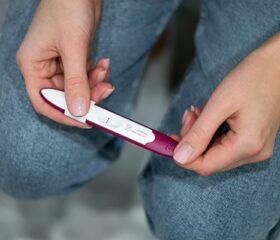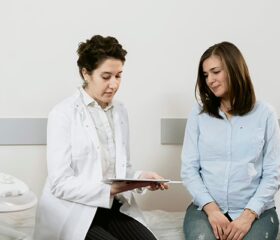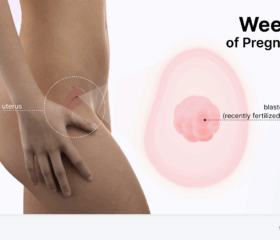Is Diarrhea a Sign of Pregnancy? Causes and Remedies
While that uneasy tummy of yours could be the result of carrying a tiny passenger, there might be other reasons why you’re running to the bathroom so much.

Diarrhea during pregnancy is more common than you might think, and although it’s usually nothing serious or long-lasting, it isn’t always something you can just ride out. It can lead to problems for you or your baby if it doesn’t ease up.
We’ll look at the common causes of diarrhea during pregnancy, how to treat it at home, and when to see your doctor.
Does having diarrhea mean you might be pregnant?
Diarrhea can be a sign of pregnancy. However, it can strike for a variety of other reasons, too. Like nausea and fatigue, it can also be a sign of a regular illness, such as a stomach bug or food poisoning.
If your digestive woes are accompanied by other common pregnancy signs, especially missing your period, that’s suggestive enough that you should take a pregnancy test. That’s the only way to know for sure—you can’t conclude that you’re expecting just because you’re struggling with diarrhea.
Is diarrhea normal during pregnancy?
During pregnancy, up to 34% of women experience diarrhea at some point. You’ll often get other gastrointestinal pregnancy symptoms alongside it, such as:
- Abdominal cramps or pain
- Loss of bowel control
- Bloating
- Fever
- Chills
- Body aches
- Weight loss
If pregnancy is sending you to the bathroom way more often than you’d like, hopefully it provides at least a little comfort to know you’re far from alone.
What can cause diarrhea when you're pregnant?
Here are some common and not-so-common causes of diarrhea when you’re pregnant:
Pregnancy hormones
“Prostaglandins” are the most common culprit here. These hormone-like chemicals (oxytocin is one of them) are the reason why many women get diarrhea during their periods.
Prostaglandins make your muscles contract and also increase activity within your digestive system. In some women, this can lead to constipation; in others, diarrhea. 1
Notably, if you’re taking a synthetic prostaglandin like misoprostol (Cytotec), it can have the same effect as your body’s own prostaglandins. This drug is used to induce labor, which is one of the reasons why diarrhea is a common occurrence in the third trimester. 1
Approaching labor
If you’ve got diarrhea, you may not be far off from labor (in that case, you don’t need to worry about whether diarrhea is a sign of pregnancy or not, since that ship has long since sailed).
It can happen anywhere from a few hours before labor to a few weeks before your due date.
Don’t worry—having diarrhea doesn’t necessarily mean you’re going into labor now. It just means that your body is relaxing and preparing for childbirth. There are other signs to look for if you’re worried that you’re going into labor, like menstrual cramps, loss of your mucus plug, and vaginal pressure. 2
Changes in your diet
When your body becomes more sensitive during pregnancy, you may find that some of the foods you ate before no longer go down so easily. 3 For example, dairy products, sugary foods, and caffeine can upset your stomach and potentially lead to diarrhea.
You may also start craving different things during your 9-month journey, or perhaps make a conscious decision to switch up your pregnancy diet to ensure your baby gets all the nutrients she needs.
Either way, when you change the way you eat, your body might not be happy with the changes (at least, at first). For example, if you begin to eat more fiber-rich foods or drink more water, these dietary shifts can cause diarrhea.
Vitamins and supplements
Similarly, if you’re taking any vitamins, supplements, or herbal remedies, they could be the cause of your gastrointestinal distress.
Some forms of magnesium supplements could increase your chances of getting diarrhea. If you’re low in magnesium, there are other ways to fill your body with this vitamin, like by eating nuts, whole grains, and green leafy vegetables. 4
You may get the same effect from supplements or herbal teas containing senna. 5 As a rule, you should avoid supplements during pregnancy (aside from your prescribed prenatal vitamin) without consulting your doctor.
Medications
If you’re taking over-the-counter or prescribed medications, look at your medicine cabinet to see if you have any of the following:
- NSAIDS (like ibuprofen and naproxen)
- Laxatives
- Antacids
- Antibiotics
- Heartburn medication
- Stomach ulcer treatments
- Chemotherapy drugs
- Immune-suppression drugs
- Metformin (for diabetes)
These drugs don’t always cause diarrhea, but they can. Before stopping any prescribed treatment, though, always talk to your doctor, whether it’s a pregnancy-related medication or something else. 6
Infection
Just like everyone else, pregnant women can contract bacterial, viral, or parasitic infections that cause diarrhea. Food poisoning is another potential culprit.
You’ll likely have a slew of other symptoms if an infection is the cause of your diarrhea, such as:
- Nausea
- Vomiting
- Fever
- Chills
- Body aches
- Dizziness
Antibiotics can treat a bacterial or parasitic infection. If it’s viral, though, drugs won’t help. Your doctor can still provide you with a treatment plan if the diarrhea doesn’t go away within a couple of days.
Contaminated food or water
This is particularly common when people travel; there’s no shortage of tourists who have experienced the dreaded traveler’s diarrhea. The Centers for Disease Control and Prevention (CDC) estimates that between 30% and 70% of travelers in a 2-week time span will develop diarrhea as a result of contamination. 7
This is caused by eating food or drinking water contaminated with bacteria, viruses, or parasites. 8
If you’re pregnant, you’ll need to be extra careful when traveling. Diarrhea—and the resulting dehydration—can be much riskier when you’re away from home and your body is already a little overstressed from supporting your growing baby. 9
When you’re abroad, be scrupulous about practicing good hand hygiene and be mindful of what you consume. For example:
- Don’t eat raw meat or fish
- Eat food that is fully cooked
- Don’t eat from buffets
- Favor fruits and vegetables that you have to peel, not ones that you just eat directly
- Don’t eat anything unpasteurized
- Don’t drink tap water (this includes brushing your teeth with it)
- Try to drink sealed drinks that are canned or bottled
- Get your drinks without ice, since this is often made from contaminated tap water 10
You should always be a little cautious when you’re away from home, be extra careful when traveling to higher-risk areas in Africa, Asia, the Middle East, and South America. 11
Certain health conditions
Some pre-existing health conditions can make pregnant women more susceptible to diarrhea. For instance:
- Hyperthyroidism
- Crohn’s disease
- Ulcerative colitis
- Irritable bowel syndrome (IBS)
- Lactose intolerance
- Celiac disease
With bowel disorders, in particular, diarrhea is often accompanied by other symptoms. Abdominal cramps, bloating, gas, skin problems, fatigue, and anemia are common. 1
How to treat diarrhea at home when you’re pregnant
Although belly woes aren’t fun to deal with, diarrhea usually isn’t life-threatening and typically only lasts a couple of days. 12 Still, it’s important to take care of yourself.
Stay hydrated
When you’re pregnant, you should drink about 6–8 medium (6.7 oz) cups of water a day at all times. 13 When you have diarrhea, aim to drink at least 8–10 cups of water a day and try to have a cup (8.1 oz) after every loose bowel movement. 14 Coconut water or herbal tea also works.
Don’t drink it all at once, though. Wait until it reaches room temperature, then take small sips every 10 minutes or so. 14 15
Replenish your electrolytes
You’re not just losing water when you have diarrhea. You also lose electrolytes like sodium, chloride, and potassium. 16
Drink soup broth to boost your sodium and juice to boost your potassium. You can also try sports drinks to replenish your electrolytes.
Avoid eating certain foods
Certain foods are tough on your digestive system and can worsen diarrhea. Here are some foods and drinks to avoid: 17
- Soda
- Coffee
- High-sugar juices
- Sugary food
- Artificial sweeteners
- Spicy food
- Fatty food
- Fried food
- Prunes and other dried fruits
- Milk and other dairy products
- Gas-causing fruits or vegetables like beans and broccoli
Cut these foods and drinks from your diet—at least temporarily—and your symptoms should start to improve.
Eat a bland diet
When dealing with diarrhea, temporarily eat a bland diet. The BRAT diet—bananas, rice, applesauce, and toast—is much easier on your tummy and helps create firmer stools. 18
The only problem with sticking to the BRAT diet is that you’ll get far fewer nutrients, especially zinc. When you’re pregnant, it’s incredibly important to deliver the right amount of nutrients to you and your baby.
So, feel free to supplement the BRAT diet with other easy-to-digest foods like:
- Cooked vegetables
- Broth-based soups
- Lean meats
- Potatoes
- Oatmeal
- Unsweetened cereal
- Saltine crackers
- Hard-boiled eggs
Although dairy is something you should probably avoid, give yogurt a try. Yogurt with live, active cultures of Lactobacillus acidophilus can improve gut health. 19
Practice good hygiene
If you’re dealing with an infection of some sort, good hygiene is going to be really important. By frequently washing your hands and disinfecting common areas, you can prevent transmitting germs to others.
Try antidiarrheal medications
If the strategies above don’t work and you’re still feeling terrible, consider taking an over-the-counter antidiarrheal medication like Imodium or Pepto-Bismol. It’s not a bad idea to clear it with your doctor first, just to make sure it’s safe to take while pregnant.
If your condition worsens, then it may be time to book an appointment and see if a prescription or even hospitalization is necessary. 20
When should you call your doctor?
Typically, diarrhea isn’t something to worry about. However, you should call and make an appointment with your doctor ASAP if: 21
- You have persistent diarrhea
- There’s blood or pus in your stool
- You have a fever over 102°F
- You’re vomiting
- You have severe stomach pain
- You’re getting severely dehydrated despite your best efforts
How to spot the signs of dehydration
Dehydration is more than just a feeling of thirst. You may be dehydrated if: 1 22
- Your skin is extra dry
- Your urine is dark-colored (like caramel instead of pale yellow)
- You’re peeing less frequently
- You’re experiencing fatigue or dizziness
What to expect if you require hospitalization
Mild cases of diarrhea are easily treatable from home. If your case is severe or long-lasting, though, you might need to go to the hospital for rehydration and treatment.
If you have severe or prolonged diarrhea, your doctor will take steps to figure out the cause. This will include:
- A physical exam
- A discussion about your symptoms, diet, and any medications you’re taking
- A stool or blood sample to check for infection
- Checking for signs of an increased heart rate, lowered blood pressure, stomach pain, or high fever
Based on the hospital’s findings, they may give you intravenous (IV) fluids to help with hydration. In some cases, you may be prescribed medicine to get your diarrhea under control. They may also want you to stay at the hospital until your symptoms improve.
Final thoughts
Diarrhea is something we’ve all had to deal with at some point, and it’s never fun. The good news is that it usually only lasts a day or two, and most of the time, you can treat it at home.
But with a baby on board, take extra precautions to avoid gastrointestinal infections and prevent yourself from getting dehydrated. Keep a close eye on your symptoms, and always inform your doctor if diarrhea does crop up, especially in the third trimester. And please, don’t forget to wash your hands!
Article Sources
- Medical News Today. "What to know about diarrhea during pregnancy" Retrieved April 30, 2025.
- MedicineNet. "How Soon Before Labor Do You Have Diarrhea?" Retrieved April 30, 2025.
- Family Health Centers of San Diego. "An Essential Guide on What to Eat During Pregnancy" Retrieved April 30, 2025.
- Mount Sinai. "Magnesium" Retrieved April 30, 2025.
- UF Health . "Drug-induced diarrhea" Retrieved April 30, 2025.
- MedlinePlus. "Drug-induced diarrhea" Retrieved April 30, 2025.
- U.S. Centers for Disease Control and Prevention. "Travelers’ Diarrhea" Retrieved April 30, 2025.
- Johns Hopkins Medicine. "Traveler's Diarrhea" Retrieved April 30, 2025.
- U.S. Centers for Disease Control and Prevention. "Pregnant Travelers" Retrieved April 30, 2025.
- American Board of Obstetrics and Gynecology, Inc.. "Pregnant Travelers" Retrieved April 30, 2025.
- ACOFP, the American College of Osteopathic Family Physicians. "Travelers' Diarrhea" Retrieved April 30, 2025.
- Medical News Today. "Is it normal for diarrhea to last for a week?" Retrieved April 30, 2025.
- Tommy’s. "How much water should I drink in pregnancy?" Retrieved April 30, 2025.
- Mount Sinai. "When you have diarrhea" Retrieved April 30, 2025.
- Banner Health. "5 Tips to Prevent Dehydration When You Have Diarrhea or Vomiting" Retrieved April 30, 2025.
- MedlinePlus. "Fluid and Electrolyte Balance" Retrieved April 30, 2025.
- Stanford Cancer Center. "Diarrhea Nutrition Tips" Retrieved April 30, 2025.
- Medical News Today. "What to know about the BRAT diet" Retrieved April 30, 2025.
- Seattle Children’s Hospital. "Diarrhea" Retrieved April 30, 2025.
- Medical News Today. "What you should know about diarrhea" Retrieved April 30, 2025.
- Johns Hopkins Medicine. "Diarrhea" Retrieved April 30, 2025.
- American College of Obstetricians and Gynecologists. "Problems of the Digestive System" Retrieved April 30, 2025.







